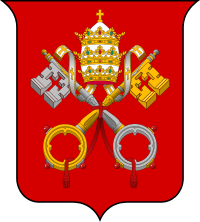St Stephen of the Abyssinians
| St Stephen of the Abyssinians Santo Stefano degli Abissini | |
|---|---|
 | |
| Basic information | |
| Location |
|
| Geographic coordinates | 41°54′6.47″N 12°27′6.74″E / 41.9017972°N 12.4518722°ECoordinates: 41°54′6.47″N 12°27′6.74″E / 41.9017972°N 12.4518722°E |
| Affiliation | Roman Catholic |
| Rite | Alexandrian Rite (Coptic) |
| Ecclesiastical or organizational status | National Church in Rome of Ethiopia |
| Architectural description | |
| Architectural type | Church |
| Groundbreaking | 5th century [1] |
| Completed | 9th century |
| Specifications | |
| Length | 35 metres (115 ft) |
| Width | 20 metres (66 ft) |
| Width (nave) | 10 metres (33 ft) |
St Stephen of the Abyssinians (Italian: Santo Stefano degli Abissini) is a Roman Catholic church located in Vatican City. The church dedicated to Stephen the Protomartyr is the national church of Ethiopia. The liturgy is celebrated according to the Alexandrian rite of the Ethiopian Catholic Church. It is the oldest surviving church in the Vatican.[1]
History
The church was, by tradition, built by Pope Leo I (ca. 400–461), and named Santo Stefano Maggiore.[2]
It was rebuilt in 1159 under Pope Alexander III, who also built a monastery for Ethiopian monks next to it.
In 1479, Pope Sixtus IV restored the church and assigned it to the Coptic monks in the city. It was at this time that the name was changed to reflect that it was served by Ethiopians (Abyssinian). It was altered under Pope Gregory XI (1700–1721), and again in 1928.
Exterior
The façade is in the style of the early 18th century. The 12th century doorway, decorated with the Lamb and the Cross, has been preserved.
Interior
The church has a single nave with ancient columns along the sides. The most important work of art is a fresco of the Madonna with Child in the Roman style from the 15th century.
Liturgy
The Feast of St. Stephen is celebrated on 26 December.
See also
Notes
- ↑ 1.0 1.1 Metropolitan Museum of Art 1983, p. 151
- ↑
 "Rome". Catholic Encyclopedia. New York: Robert Appleton Company. 1913.
"Rome". Catholic Encyclopedia. New York: Robert Appleton Company. 1913.
References
- Touring Club Italiano (1999), Roma, S.L.: Touring Club Italiano, ISBN 88-365-1324-7
- Metropolitan Museum of Art (1983), The Vatican:spirit and art of Christian Rome, Malibu: The Metropolitan Museum of Art, p. 151, ISBN 0-87099-348-8,
It is the oldest surviving church in the Vatican, for it dates back to Pope Leo the Great (440-461)
- Webb, Matilda (2001), The Churches and Catacombs of Early Christian Rome, Brighton: Sussex Academic Press, p. 36, ISBN 1-902210-57-3
| |||||||||||||||||||||||||||||||||||||

